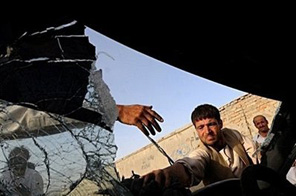21 killed in Afghanistan
KABUL: Taliban attacks rocked Afghanistan Tuesday two days before landmark presidential elections, claiming at least 21 lives as a rocket slammed into the presidential compound in Kabul.
The violence, striking at the heart of the capital, followed renewed Taliban threats to sabotage Thursday's ballot in which 17 million Afghans are eligible to vote, amid heightened fears they could stay away.
But the NATO-led coalition said despite a spike in insurgent strikes, less than one percent of polling stations are at risk of being attacked.
A suicide car bomb Tuesday targeted a NATO convoy on a busy road near a US military base and a market, killing 10 people including a NATO soldier, and wounding more than 50, officials said.
"Updated reports indicate that those killed were one ISAF service member, seven Afghan civilians and two Afghan civilian employees of the United Nations Assistance Mission in Afghanistan," the NATO alliance said in a statement.
"Two ISAF service members and 53 Afghan civilians were also wounded in the incident," the International Security Assistance Force said.
UN Secretary General Ban Ki-moon expressed distress over the death of two UN staff in the second deadly suicide attack targeting NATO in Kabul in two days.
"All of a sudden I heard a big explosion. I don't know what caused it. I saw my son wounded. I had to rush him out of the area," one Afghan man whose clothes were covered in blood told reporters at the scene.
"It was a suicide attack... targeting a supply convoy of foreign forces," said police official Sayed Abdul Ghafar Sayedzada.
The Taliban claimed responsibility for the attack and for firing volleys of rockets into the capital and the eastern city of Jalalabad, where at least 10 people, mostly women and children, were wounded.
A spokesman for Karzai confirmed that a rocket hit the outer perimeter of the presidential compound.
In southern Afghanistan, the Taliban's main powerbase, a suicide bomber walked up to an Afghan military checkpoint in Uruzgan province on Tuesday and blew himself up, killing three soldiers and two civilians, police said.
Attacks also killed an election candidate and three electoral workers in the usually peaceful north, officials said.
Two US soldiers were killed in the east as visiting US Republican Senator John McCain said troop levels needed to be "significantly increased."
The Taliban were overthrown by the 2001 US-led invasion of Afghanistan but have orchestrated a deadly insurgency against the Western-backed administration and foreign troops, with violence now at record highs.
Although thousands of US and NATO troops pushed into militant strongholds months before polling day, at least eight districts remain outside state control and up to 12 percent of polling centres may not open, authorities said.
About 300,000 Afghan and foreign forces -- every man available, officials say -- will be deployed to guard between 6,200 and nearly 7,000 polling centres, with the final figure depending on security risks, authorities say.
Canadian Brigadier General Eric Tremblay, spokesman for the NATO-led coalition, played down the threat to the election from the insurgents.
"Chances are, when you're looking purely at statistics, that they're not going to be able to attack even one percent of the entire polling sites in this country," Tremblay said.
The government has expressed confidence that the electorate will flock to the polls, defying threats and fears of violence, but appealed for an Afghan and international media blackout on reporting attacks during the elections.
Karzai's office said the president, tipped to hold on to power, had been briefed by cabinet ministers and election officials about the state of the nation and had directed them to "ensure adequate security across the country."
Human Rights Watch (HRW) raised concern that the polls could be compromised by low turnout, violence, fraud and intimidation.
Afghanistan's foreign allies are footing the bill for the 223-million-dollar election and have mobilised massive resources to make the ballot a success.
Progress has been made since the collapse of the five-year Taliban regime, but many people are frustrated. Despite billions of dollars of Western aid, most lack electricity, roads are bad, jobs are scarce and corruption is rife.
While Karzai is the favourite to win the election, an energetic campaign by ex-foreign minister Abdullah Abdullah has boosted the chance of a run-off.






